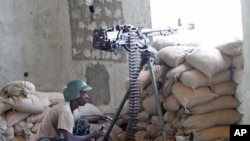British Prime Minister David Cameron is preparing to host 40 world leaders Thursday in London to discuss how best to foster stability in Somalia. It will be the first time in a decade that the international community will collectively focus on ways to end Somalia’s 21 years of chaos and conflict and rebuild the devastated country. But while the international community might have high hopes, expectations are more tempered among the Somali people.
Despite the ongoing strife, now in its third decade, life in Mogadishu is stabilizing. In terms of security, the African Union peacekeeping mission (AMISOM) continues to push the al-Qaida-linked militant group al-Shabab, further from the city.
On the political front, at a meeting in Garowe, in Puntland, last weekend, ministers and international observers agreed to a timetable for the establishment of a new government by August.
Before departing for the London talks, the head of Somalia’s seven-year-old transitional federal government (TFG), President Sheikh Sharif Shiekh Ahmed, confessed he was surprised when the British government announced its plan to hold this week’s conference. He spoke through a translator. “I see it as a window of opportunity. The international community has finally seen where the problems lie and we will finally get a comprehensive solution," he said.
President Sharif reflected on why these talks might succeed where numerous others have failed in the past. “For every conference in the past, it has been said it is the last chance for Somalia. But the Somali people are strong. They want to live in peace ... we have made progress that can be built on," he said.
World leaders set to attend the London conference include French President Nicolas Sarkozy and U.S. Secretary of State Hillary Clinton.
The British have identified four areas they hope the international community can assist the long-failed state: social and political capacity building, military security, and sustaining the humanitarian effort amid the ongoing drought on the Horn of Africa. They may also discuss Somali piracy, which costs the global economy an estimated $7 billion a year.
While grateful to Britain for putting Somalia back on the political agenda, President Ahmed, without being explicit, suggested Somalia has been a low priority for the international community, unlike Afghanistan and Iraq. “Of course the Somali people have to have ownership of their own issues. But if you look at any country where there has been a failure in the system, the international community has come to their aid," he said.
Mogadishu might feel safer today than at any time in the last two decades. But despite its retreat from the city in August of last year, al-Shabab has begun an intensive bombing campaign.
Sources say the Islamist insurgents detonate an average of six improvised explosive devices detonate each day.
Many local leaders hope the London conference will mean AMISOM will be given helicopters and planes to attack al-Shabab, a strategy Kenya is successfully adopting in the south of the country.
Dayib Hussein, is wearing the shirt of London football club Chelsea, but like many people on the streets of Mogadishu, he has no knowledge of the talks that will take place in his team’s home city. His wife does know about the talks, and says she wants the conference to supply more resources to defeat al-Shabab and bring some kind of normalcy to the city. The Hussein's two year old son was injured by an al-Shabab car bomb a week ago.
High Hopes, Tempered Expectations for International Somalia Conference




